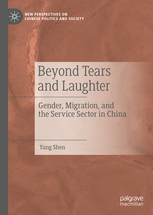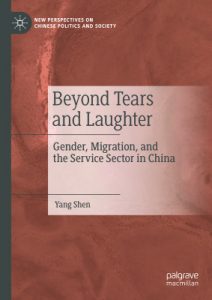In Beyond Tears and Laughter: Gender, Migration, and the Service Sector in China, Yang Shen examines the life experiences of men and women who have migrated from rural China to Shanghai to make a living in the restaurant service sector, exploring how gender, class and hukou shape these experiences. Attending to the motivations, aspirations and desires of economic and social lives that are constantly being reshaped and drawing connections between work, intimate relationships, agency and subjectivity, this book is an excellent read for understanding gender and labour in contemporary China, finds Kanak Rajadhyaksha.
This book review has been translated into Mandarin by Elles Houweling (LN814, teacher Dr Lijing Shi) as part of the LSE Reviews in Translation project, a collaboration between LSE Language Centre and LSE Review of Books. Please scroll down to read this translation or click here.
Beyond Tears and Laughter: Gender, Migration, and the Service Sector in China. Yang Shen. Palgrave Macmillan. 2019.
 Find this book (affiliate link):
Find this book (affiliate link):![]()
In Beyond Tears and Laughter: Gender, Migration, and the Service Sector in China, Yang Shen weaves together the everyday experiences of men and women who have migrated from rural China to Shanghai to make a living. In the context of a pro-urban development model and consequent migration from rural to urban areas, the book’s focus is on migrant workers in restaurants, part of the burgeoning service sector that employs a large number of migrant workers in urban China. With the objective of examining how migrant restaurant workers experience transformation in a deeply unequal economy, Shen explores the ways in which workers’ life experiences are gendered, the exercise and expression of agency and subjectivity in daily life and how gender, class and hukou shape everyday experiences.
Shen adopts an intersectional lens in studying the life experiences of migrant workers. She extends the dimensions of intersectionality beyond gender, race and class to also include hukou – a household registration system that categorises Chinese citizens as agricultural or non-agricultural. This lens serves to examine how social structures of patriarchy produce gendered experiences of work, construct ambition and desire and also shape life trajectories.
Locating her study in a restaurant in Shanghai, Shen uses a quantitative survey, in-depth interviews and participant observation to produce rich narratives of the meanings that migrant workers make of their roles as sons and daughters, husbands and wives, mothers and fathers, and of their own ambitions and place in society. Shen’s participation in her study as a table-server deserves special mention; working as a table-server, sharing the same living quarters as the migrant workers and her friendship with them have resulted in a nuanced understanding of the workers’ lives and experiences.

Shen delves into the everyday working lives of the migrant workers, their intimate relationships and leisure time to explore how their lives have been transformed after migration. The concept of ‘non-patrilocality’ is crucial to understanding these experiences. Shen conceptualises non-patrilocality as a temporary space wherein migrant workers, both single people and married couples, neither live with their parents nor their in-laws. This alteration to traditional household structures has brought about profound change in agency and subjectivity for both women and men and has reshaped intimate relationships. Life after migration improves for women because it reduces household workload and restructures domestic responsibilities. It also allows them to escape complex relationships in their home villages, gives them financial independence and the opportunity to find partners for marriage. Parents continue to exert authority over children’s lives, with the children making room to exercise agency in whatever ways they can.
Shen’s findings show that gender, class and hukou come together to create a workplace that is gendered, feminised and hierarchical. Gender segregation across positions in the restaurant (inter-job segregation and intra-job segregation) is based on social constructions of what is appropriate work for both genders. Women are more commonly assigned the job of table-servers, a job that is higher up the ladder in a restaurant, while men are more commonly assigned to be pantry-helpers, a job lower down the restaurant job ladder.
Gender norms that workers held dear formed the basis for the kinds of work they chose at the restaurant – men often chose to be pantry-helpers because they believed the physical work involved was a man’s job, while women chose to be table-servers because this was work that required more sensitivity. Many male pantry-helpers, for example, did not want to be table-servers because they associated table-serving with being deferential, a quality that they associated with femininity. Societal norms of gender hierarchy conflicted with job hierarchy, making gender relationships complex. Women were not denigrated for working as table-servers because their primary role was considered to be that of mothers and daughters fulfilling filial obligations. Men doing the same were considered to have no future because in doing such work, they didn’t live up to societal expectations of ambition, enterprise and masculinity.
Migration results in agency being exercised in different ways and subjectivity constantly being reshaped through interactions with colleagues, customers and family. Narratives of everyday encounters add layers to the complexity of transformation experienced by migrant workers. Shen argues that the workers are able to exercise agency in some instances and choose to cope in others, depending on the situation. For example, women might choose to elope if their parents don’t approve of their partners but continue to support their parents with remittances after marriage. Migration might alter filial piety with respect to romance and marriage but not with respect to economic support for parents. In the workplace, migrant workers might choose to retort when yelled at by customers or cope to make the situation more bearable.
Shen’s description of how migrant workers spend leisure time is also an analysis of how they cope with low wages, restrictive work hours and the monotony of work coupled with the desire to be successful. Leisure is gendered. Women usually took up sewing and embroidering, the finished products of which they intended to use to decorate their homes. Many male migrant workers spent their leisure hours gambling, an activity they hoped would make them rich and give them lives they couldn’t dream of otherwise affording. Financial success through gambling would mean an assertion of masculine values, something the men felt they didn’t live up to as restaurant workers. Shen engages with agency as neither positive nor negative, but brings out the different forms in which it is exercised and how these forms change the life trajectories of those exercising it.
Migration gave both male and female workers horizontal mobility, with workers often switching across the service and manufacturing sectors, but it did not result in upward mobility. This gave the workers the feeling of being trapped in economic and social inequality for life. Shen’s follow-up with the migrant workers she interviewed shows that most had left their jobs in the restaurant but were working in entry-level jobs in the manufacturing and service sectors, with wages that were similar, but with trade-offs in terms of intensity of work, holidays and leisure time.
The strength of Shen’s ethnography lies in its empirical basis: she draws on motivations, aspirations and desires in economic and social lives that are constantly being reshaped. While migration does not level economic and social playing fields, it no doubt improves the financial condition of the migrant workers. In analysing experiences of life, rather than solely work, Shen efficiently draws connections between labour, intimate relationships, agency and subjectivity. Overall, this book is an excellent read for an understanding of gender and labour in contemporary China.
Note: This review gives the views of the author, and not the position of the LSE Review of Books blog, or of the London School of Economics. The LSE RB blog may receive a small commission if you choose to make a purchase through the above Amazon affiliate link. This is entirely independent of the coverage of the book on LSE Review of Books.
Image Credit: Photo by 丁亦然 on Unsplash.
Beyond Tears and Laughter: Gender, Migration, and the Service Sector in China. Yang Shen. Palgrave Macmillan. 2019.
Review translated into Mandarin by Elles Houweling (LN814, teacher Dr Lijing Shi)
 在 《超越泪水与笑声:中国的性别、移民和服务业》 杨绅(音)综合了从中国农村迁移到上海大城市中谋生的众男女的日常生活经历,探讨了城市化的改变;以及在农村到城市的迁移背景下,人口流动的发展模式。这本书聚焦餐饮行业的外来务工人员,这也是新兴服务业的一部分。中国城市雇用了大量的外来务工人员。以研究外来餐饮业服务人员在如何在极度不平等的经济状态中经历改变为目标,作者探讨了这些人的生活如何被性别化,他们在日常生活中的自主权和主观性;以及性别、阶级和户籍如何塑造了他们每一天的生活体验。
在 《超越泪水与笑声:中国的性别、移民和服务业》 杨绅(音)综合了从中国农村迁移到上海大城市中谋生的众男女的日常生活经历,探讨了城市化的改变;以及在农村到城市的迁移背景下,人口流动的发展模式。这本书聚焦餐饮行业的外来务工人员,这也是新兴服务业的一部分。中国城市雇用了大量的外来务工人员。以研究外来餐饮业服务人员在如何在极度不平等的经济状态中经历改变为目标,作者探讨了这些人的生活如何被性别化,他们在日常生活中的自主权和主观性;以及性别、阶级和户籍如何塑造了他们每一天的生活体验。
作者在研究农民工的生活经历时釆用了交叉视角 — 她在性别、种族和阶级之间相互关系的范围之外,又加上了了户籍制度。户籍制度将中国公民分为农业与非农业人口。 这个角度用以检验父权制度的社会结构如何产生性别化的工作体验; 构筑雄心和渴望, 以及它如何塑造人生的轨迹。
作者将她的研究定位于上海的一家餐厅,她通过了定量调查、与工人深入的访谈和细致的观察;详细地叙述了农民工所扮演的子女、夫妻、父母的角色,以及他们的志向和社会地位。特别值得一提的是,作者以餐桌服务员的身份参与了她的研究。作为餐桌服务员,她与外来务工人员同住一个宿舍,以及她与外来务工人员的友谊使人们对这些工人的生活状态和经历有了更透彻的了解。

Image Credit: Photo by 丁亦然 on Unsplash
杨绅深入研究了农民工的日常工作,他们如何处理亲友关系和休闲时间,并探讨他们在迁移后如何改变了生活。“非原籍概念”对于理解他们这些经历非常重要。杨女士将“非原籍概念”理论化为一个临时空间。 在这个空间里,农民工(单身者和已婚的)既不与父母同住,也不与姻亲住在一起,这深刻改变了传统的家庭结构,主观上改变了两性的归属,并重塑了亲密关系。到城市后,妇女的生活改善了,因为在新的环境中家务量减少了,并调整了家庭的责任;同时还使她们摆脱了复杂的乡村关系,实现了财务独立,使得她们有机会寻找婚姻伴侣。尽管农民工的父母们继续在他们的生活上施加威严,但迁移到城市为他们尽其所能地行使自主权提供了空间。
杨绅的研究发现显示:一个工作场所可以由性别、阶级和户籍共同建构。 这个工作场所是性别化的、女性化的,且等级化的。餐饮业中各个职位之间的性别隔离(工作间隔离和工作内隔离)是基于“什么工作是适合男性或女性”的概念;这是一个由社会定义的概念。女性通常被分配去做餐桌服务员,这项工作在饭店的级别上更高;而男生则更普遍地被分配为食品配送员,这项工作在餐厅隶属于工作级别的下端。
劳动者们固有的性别规范构成了他们选择餐厅工作的基础。男人通常选择在食品储存室工作,因为他们相信所从事的体力劳动理应是男人的工作;而女人则选择做餐桌服务员,因为她们认为这个工作需要高情商,更适合让女性干。例如,许多食品储藏室的男工不想成为餐桌服务员,因为他们将餐桌服务与礼貌温顺联系在一起,觉得这个工作更符合女性气质。社会规范下的性别等级与工作等级相互冲突,从而使性别关系变得复杂。在这里,担任餐桌服务员并非贬低妇女,因为妇女一向被视为行孝的母亲或女儿。但男人如果做这样的工作,人们会认为他们没有前途和抱负,不思进取;有悖于社会对男性气质的期望。
在不同环境下的,迁移导致外来务工人员的自主权与同事、客户和家人关系被不断地重塑。日常工作与生活中的遭遇给农民工观念的复杂型和转变添加了层次。作者认为在某些情况下,农民工可以行使自主权。而在某些情况下,则必须根据情况选择如何应付。例如,如果父母不赞同自己寻找的伴侣,女性可能选择“私定终身”,但结婚后会继续通过汇款支持父母。迁移可能会改变他们的恋爱与婚姻,但因为孝顺,不会改变他们对父母的经济支持。在工作场所,农民工可能会在顾客大声吼叫时选择反驳应对,或以忍受的方式处理。
作者对农民工休闲生活的描述,也是在分析他们如何应对低工资,如何应对呆板单调的工作时间以及其对成功渴望。休闲活动也有性别之分。妇女通常从事缝纫和刺绣,她们打算将其成品用于装饰自己的房屋。而许多男性农民工则将闲暇时间用于赌博,他们寄希望于这项活动能使自己变得富有,并为他们提供原本无法负担的生活费用。通过赌博获得财务上的成功,即意味着维护通过餐馆打工而无法实现的“男子汉”价值观。作者与农民工之间的交往不卑不亢;她挖掘了农民工生活与工作的不同形式,以及这些形式如何改变了农民工的生活轨迹。
迁移使男性和女性工人都可横向流动,工人经常在服务业和制造业之间流动,但这并没有实现向上流动,这使得工人们感到永久陷入在经济与社会的不平等之中。作者在对农民工的采访及跟踪调查显示,大多数人离开了饭店的工作后,仍在制造业和服务业从事入门级别的工作,除了工资相近外,两者在工作强度、假期与休闲时间方面各有利弊。
该民族志研究的优势在于它以事实工作经验为基础,分析了在经济社会生活中不断改变的的动机、愿望、和欲望。尽管迁移并没有使得农民工实现在经济和社会领域的公平,但毕竟改善了农民工的财务状况。通过分析他们的生活经历而非局限于他们的工作,作者有效地描绘了劳力与亲密关系、自主权、与主观性之间的密切联系。总体而言,这本书是了解当代中国两性关系与劳动力的杰作。







